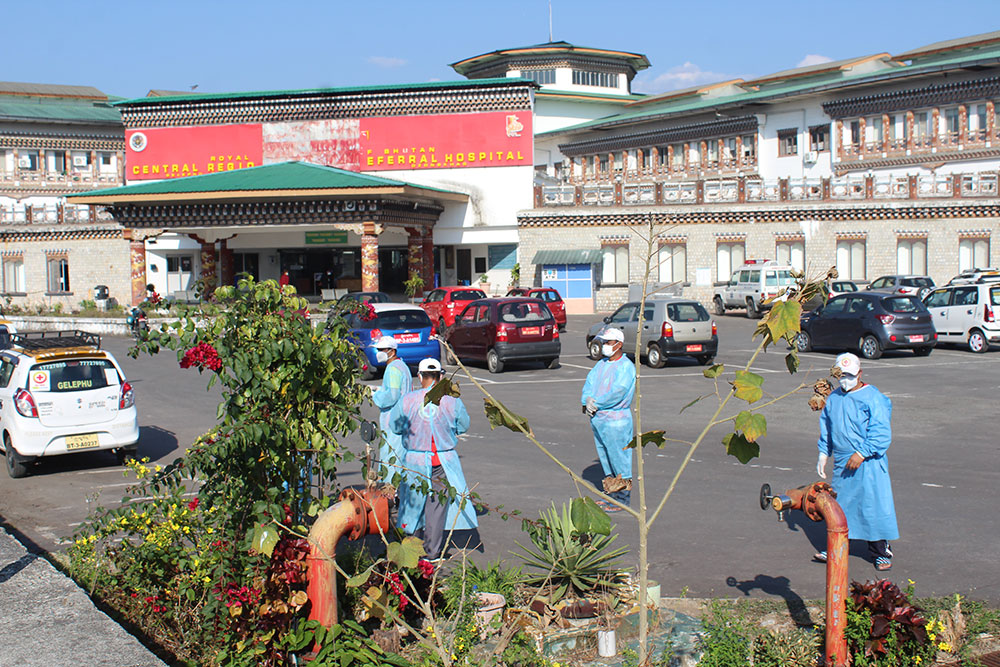Residents worry about prolonged lockdown
Nima | Gelephu
More than 70 positive cases were detected from over 9,000 samples collected and tested during the mass testing held in Gelephu thromde in the past five days.
Over 30 cases were reported from the community. Sarpang imposed the longest lockdown since the pandemic hit the country in March 2020.
With more positive cases reported during the mass screening, residents say prolonged lockdown was not effective in containing the spread of Covid-19. Many say the task force needs to consider the impact of prolonged lockdown on livelihood.
Medical superintended with Gelephu Central regional referral hospital, Dr Choeda Gyeltshen, said the mass screening was conducted to determine the lockdown relaxation.
“We don’t know for sure but the main reason for mass testing was to determine the lockdown relaxation. The virus could have spread all over the place without a lockdown,” he said.
He added that Gelephu hospital would continue to provide essential medical services through mobile health clinics and teleconsultations. “Ambulance service will attend critical cases. The surveillance team will continue contact tracing after the mass testing,” Choeda Gyeltshen said.
Gelephu has the highest number of active cases in Sarpang: more than 550 cases reported since January 16. The dzongkhag announced the first phase of relaxation last week and further relaxation was expected after the mass testing.
A resident from Gelephu said the number of people in need of essential support increased over the week. “Some could not afford essential supply, mostly daily workers who run out of money without work. It’s important to consider phase-wise relaxation,” he said.
He added that there was not much of hue and cry from the public during the initial days. “Now they are starting to face problems. Many are stranded here. Some were here for medical treatment.”
A private firm owner in Gelephu, Dorji Samphel, said the people with stable sources of income were comfortable with the lockdown.
“There was not much of impact on big companies. Small ones are facing a tough time. It’s becoming difficult to afford a meal for the day,” he said.
He added that it’s time to start relaxation. “People were home during the lockdown. It’s either breach of protocols or frontline officials getting exposed on duty, spreading the virus,” Dorji Samphel said.
More than a month into lockdown, there are people struggling to get essential supplies on time in Gelephu today. The movement between zones is restricted even for emergency cases, according to residents.
Another resident said, “We have to sensitise and convince people. The cause of the community outbreak is uncertain. Gelephu is a big place and we don’t have the capacity to secure all corners. We need to take the community on board.”
He added that it was not convenient to place the whole zone under lockdown because of pocket cases. “We could explore other means; cordon the red cluster and let people in other areas live unaffected. There is too much impact on the economy.”
A Gelephu resident Dorji Norbu said that it would be better to consider home quarantining primary contacts and travellers. “Cordon red buildings as per the norms followed in Thimphu and start phase-wise relaxation,” he said.
He added that there were 100 recovered cases against more than 100 positive cases reported daily. Many buildings are marked as red, many transitions to yellow and green every day.
“Red building must be well guarded. Livelihood would reappear then. Education for children, economy, and livelihood of lower-income groups could be restored,” said Dorji Norbu.
Meanwhile, from more than 745 cases reported from Sarpang, 445 recovered as of February 14. There are more than 300 active cases in the isolation facilities so far.


